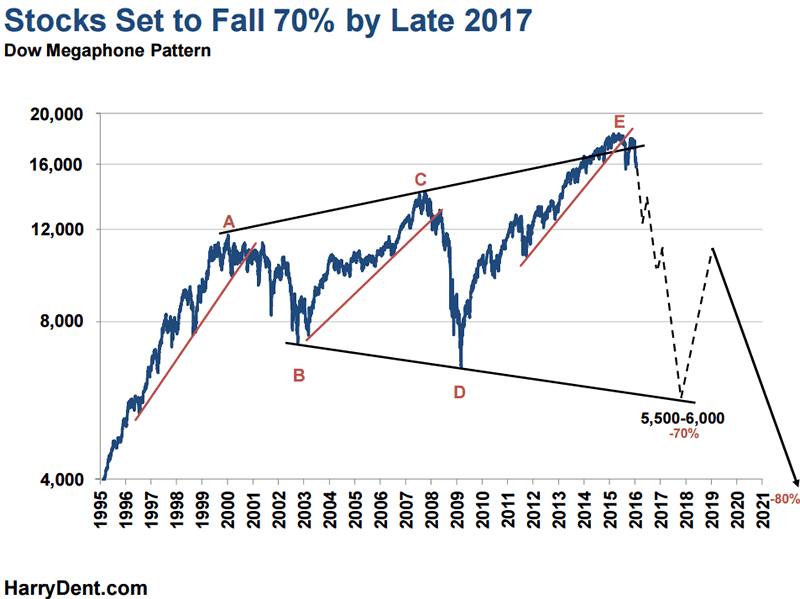What constitutes a stock market crash
A stock market correction is when the market falls 10 percent from its week high. Wise investors welcome it.
Stock Market Correction vs Crash. How to Protect Yourself.
A pullback allows the market to consolidate before going toward higher highs. It's a natural part of the market cycle.
Corrections can occur in any asset class. It can be a gut-wrenching time. Many beginning investors will feel like joining the mad dash to the exits. That's exactly the wrong thing to do. The stock market usually makes up the losses in three months or so. If you sell during the correction, you will probably not buy in time to make up your losses.
When the stock market is going up, investors want to get in on the potential profits. It leads to irrational exuberance. That makes stock prices go well above their underlying value. A correction is when prices return to a sensible level. That's when the market falls another 10 percent, for a total decline of 20 percent or more.
Stocks are how corporations get cash to grow their businesses. If stock prices fall dramatically, corporations have less ability to grow.
Firms that don't produce will eventually lay off workers to stay solvent. As workers are laid off, they spend less. That means more layoffs. That's because a crash happens too fast.
Stock-market crash of The countdown begins - MarketWatch
Trying to decide if a correction is turning into a crash is known as timing the market. It's nearly impossible to do.
Stock market crash - Wikipedia
Just when you're sure the 5 percent drop will turn into a 10 percent correction, the market rebounds and hits new highs. The best way to protect yourself from a correction will also protect you from a crash.

That means holding a balanced mix of stocks, bondsand commodities. The stocks will make sure you profit from reviews of binary options broker binex ru upswings.
The bonds and commodities protect you from market corrections and crashes. The specific mix of stocks, bonds, and commodities is called your asset allocation. It depends on your personal financial goals. If you don't need the money for years, then you'll want to have a higher mix of stocks.
If you require the money next year, you'll want more bonds. The best way to create the right asset allocation for your goals is to work with a financial planner. He or she has computer programs that determine the right mix. Your planner can also suggest good individual stocks, bonds, or mutual funds that have a proven track record.
Once you are well-diversified, make sure you rebalance your portfolio every year. For example, if commodities do well and stocks what constitutes a stock market crash poorly, your portfolio will have too high a percentage of commodities.
To rebalance, you'll sell some commodities and buy some stocks. That forces you to sell high the commodities and buy low the stocks. If you want, you can take further precautions.
When stock indices like the Dow hit record highshow to make money from chicken farming some of your winners.
Hold this money in a liquid account like money markets or Treasuries. If a correction hits, use that cash to buy some stocks at lower prices. You could use making money wikihow cost averaging to slowly buy back in after the market falls 5 percent, then again at 10 percent.
You could also buy gold if the stock market corrects.
Studies show that gold prices increase for 15 days after a crash. The stock market typically has a correction several times a year.
For example, between andmore than half of all quarters had a correction. That averages out to 2. That averages out to. Why would the market correct even when economic data is upbeat? Investors look at future expected earnings to forecast corporate profits.
They buy or sell stocks based on these projections. Sometimes investors become too optimistic. They create a rally that exceeds current economic performance. That's when the market gets over-extended. Once that happens, any bit of doubtful news causes a correction. As long as the future trend remains optimistic, the buying will resume.
That leads to an even stronger bull market rally. Most recessions occur with stock market declines of 30 percent or more. A crash can create them, but usually larger economic events are the underlying cause. That's what makes a crash more devastating than a correction. Search the site GO. US Economy Glossary Stock Market Fiscal Policy Monetary Policy Trade Policy Real Estate Economic Theory Supply Demand National Debt Fiscal Policy Monetary Policy Trade Policy GDP and Growth Inflation U.
Markets World Economy Economy Stats Hot Topics. Updated April 26, What causes a correction? Typically, it's an event that creates panicked selling. History The stock market typically has a correction several times a year. Get Daily Money Tips to Your Inbox Email Address Sign Up. There was an error. Please enter a valid email address. Personal Finance Money Hacks Your Career Small Business Investing About Us Advertise Terms of Use Privacy Policy Careers Contact.